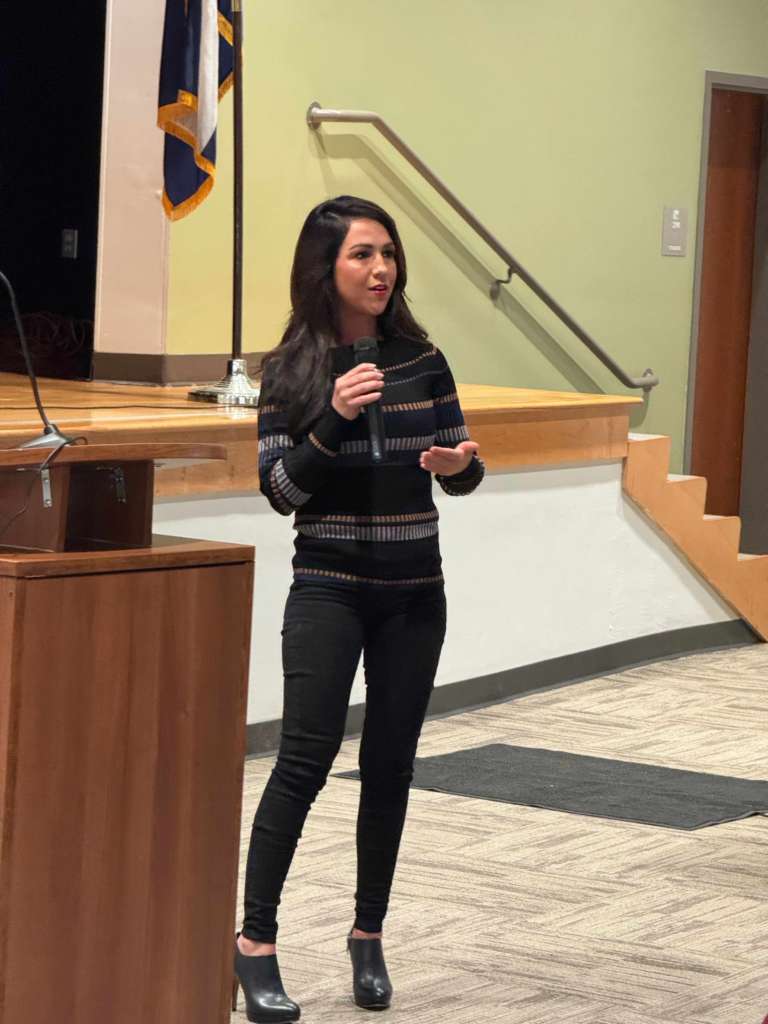
Fresh from their congressional candidate debate in Weld County Thursday night, five of the 10 Colorado Fourth District hopefuls arrived bright and early at a Douglas County Republican breakfast to keep the debate going over who should earn the nod of GOP primary voters.
Current congresswoman Lauren Boebert, who represents Colorado’s 3rd district, former state Sens. Ted Harvey and Jerry Sonnenberg, who is now a Logan County commissioner, businessman Chris Phelen and former conservative radio show host Deborah Flora showed up to address a crowded room of Douglas County conservatives.
Representatives Mike Lynch and Richard Holtorf could not attend as they had to be at the state capitol to elect a new house minority leader, following Lynch’s resignation over his recently discovered drunk driving and firearms arrest. Holtorf’s campaign manager spoke on his behalf. It’s unclear why candidates Peter Yu, Trent Leisy, and Justin Schrieber didn’t attend.
During the roughly hour-long forum, the candidates mostly spent their time extolling the virtues and beliefs that make them more conservative than those standing next to them, including who would be tougher on immigration and who has a longer track record of supporting right-wing policies.
Even committing crimes isn’t a sticking point, with six candidates having admitted they’d been arrested and exchanging high-fives at the prior evening’s debate. Despite her own multiple arrests, Boebert said she would continue to hold the “Biden crime family accountable for their bribery and corruption schemes.” While Hunter Biden, president Joe Biden’s son, has been indicted on two counts, he hasn’t been convicted of any charges.

The only noticeable difference among them, other than Boebert’s very short history living in the district, is whether they support a federal abortion ban.
Sen. Kevin Van Winkle from Highlands Ranch asked Boebert to explain her statement from the previous night that several of her primary opponents took a pro-choice position rather than a pro-life one.
“I’d like to know who those candidates are because if we’re going to elect a Republican to go to Congress, I want to know that person is pro-life,” said Van Winkle.
Boebert replied that she couldn’t remember the names and instead chose to go down the line and have each candidate state if they would vote for a federal heartbeat bill or a federal ban on abortions, to which she said her answer was yes.
A heartbeat bill, also known as a fetal heartbeat bill, would make abortion illegal in the United States as soon as a heartbeat is detected, usually around six weeks into the pregnancy or after the woman’s first missed period.
Phelen said he believes in banning abortion and would support a heartbeat bill, but only if such a bill passes at the state level. “That doesn’t make me any less pro-life than anyone else up here. It makes it about the constitution and what the Supreme Court decided,” said Phelen.
Holtorf’s representative stated that while Holtorf is a pro-life Catholic, he disagrees with a federal ban. Instead, he believes it’s a state’s issue. Yet, earlier this month, Holtorf told his colleagues at the capitol he’d paid for a former girlfriend to have an abortion and that doing so helped her “live her best life.”
Harvey and Sonnenberg agreed with Boebert and said they would support a federal ban.
“It’s not a state’s rights issue. It’s a human rights issue. No state has the right to take the life of an unborn child. We are created by the King of Kings and Lord of Lords. We get our inalienable rights from the creator. It appalls me that five people on that stage said we shouldn’t protect it at the federal level. My God, we are Republicans. We should be better,” said Harvey to audience applause.
While staunchly pro-life, Sonnenberg was the only candidate who expressed a willingness to compromise to pass a federal ban, saying he would support a federal ban that begins at 20 weeks so there aren’t abortions at the time of birth.
Flora, who is also outspoken on conservative parent’s rights issues, said she’s pro-life but didn’t answer Boebert’s question about supporting a federal ban. Instead, she said, “One of my biggest outrages is that we live in a state where this is the abortion destination of America, and most of our neighbors don’t know that abortion is possible up until the moment of birth in this state.”
Sonnenberg and Flora’s statements that Coloradans have the right to abort a pregnancy even as they are giving birth isn’t correct. According to PolitiFact, a nonprofit fact-checking project started by the Poynter Institute, “While viability is determined on a case-by-case basis and dependent on a variety of factors including gestational age and fetal weight, a baby that is in the process of being born — or “moments before birth” — is unlikely to meet the standard under which abortion is legal.”
According to the Centers for Disease Control and Prevention, nearly 93% of abortions in 2019 took place at or before 13 weeks gestation. About 6% occur between 14 and 20 weeks gestation. Less than 1% of abortions occur at 21 weeks or later.
Despite Republican efforts to legislate stronger abortion bans, opinion polls continue to show that most Americans support legal abortion to some degree. A 2022 survey by the Pew Research Center found 61% of respondents believe abortion should be legal in all or most cases, while 37% say it should be illegal in all or most cases.



